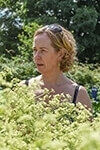At BCU Polly teaches dance and movement to undergraduate and postgraduate students.
She also guest teaches externally including open Skinner Releasing Technique workshops and classes.
Polly’s practice encompasses performance, film, and words.
She has made performance and screendance works that have been shown across four continents to critical acclaim including ‘Best Of’ for Making Lemonade in Transmit International Screendance festival, Philadelphia, USA, and finalist for Vis-er-al in Screendance Festival, Stockholm, Sweden.
Her current work is a long-term research project in EcoSomatics, developing since 2017 at an inner-city urban allotment plot, entitled And So We Sow. It investigates the nature of embodiment and the multiple ways in which this awareness impacts connections to our environment. Polly’s EcoSomatic work focuses on body-mind-ecology, and brings together embodied dance studies with social justice, environmental activism and eco-feminist approaches. It asserts an holistic approach to environmental consciousness: one which recognises that our bodies and minds are not separate from the land but are intricately connected to it.
She is the convenor of the EcoSomatics Conversation series: https://www.researchcatalogue.net/view/3022557/3022558
Polly is always pleased to hear from prospective students in her research area. She also supervises MA and MFA research projects.
Completed PhD students:
- Masie James: Living in and through the body: new principles and possibilities for the impact of somatic practices for pain relief. (2024)
Current PhD students:
- Alexah Tomey-Alleyne: Dreaming the Impossible: reimagining Blackness through dance improvisation
- Jingya Peng: Movement training for actors
- Isla Greenwood: Immersive multidisciplinary storytelling as a tool for re-enchantment and subsequent form of resistance.
Chapters in edited collections:
- (2024) The Poetics of Eco-Somatics- on body, mind, and ecology, in ‘Encountering Environments’, (Hunter et al), UK: Routledge
- (2023) We Reap What We Sow: EcoSomatics, Embodiment and Urban Allotment Gardening. Part II: spring – late summer. February – September. in ‘Digital Performing Arts: Participatory Practices in a Digital Age’, The University of Arts Press, Serbia p204-229
- (2019) Beyond Technique- Letting Go and the Art of Making Dances; in ‘Skinner Releasing Technique, A Movement and Dance Practice’, (Emslie et al) Triarchy Press, UK p63-80
Journal Articles:
- (2024) An (incomplete) manifesto for gardening as an EcoSomatic practice, Journal of Dance and Somatic Practices, special issue, Reconnections: Looking back, moving forward, enacting change.
- (2024) Video essay: These Hands; an EcoSomatic approach to a woman’s labour- of the body, and on the land, Journal of Embodied Research, Ecologies of Embodiment issue.
- (2023) Video essay; Performing the garden: embodiment and the urban allotment in a digital age, video, film and practice for the web-anthology of practice research projects, The University of Arts, Serbia & CIPA, BCU, UK (2023)
- (2021) We Reap What We Sow, embodiment and urban allotment gardening. Part 1: autumn- late winter. October- January, Working with the Vegetal issue, Ruuku Journal https://www.researchcatalogue.net/view/785639/785640
- (2019) Slowing and Stilling; gardening and Releasing, Journal Dance and Somatic Practices,
- Volume 11, Number 2, 1 December 2019, pp. 209-226
- (2013) Dancing bodies, Moving Images, International Journal of Screendance 3, pp. 144-150, with Barzey, A.
Performance and Screendance:
Polly has made over twenty five performance & film works that have been shown nationally and internationally since 1994. Examples include:
(2015) Vis-er-al; single screen dance film
(2013) Making Lemonade; multiple screen dance film installation & single screen work
(2007) Multiple Body; multiple screen dance film installation & single screen work
